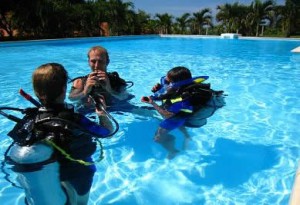
Choosing an Instructor- They do work for you!

Many people choose an dive instructor with less thought than they give in choosing a new television. My question is why? A television does not hold your life in its hands. The instructor you choose in all reality does. Some do not even have a choice of who the instructor will be. They sign up with a large shop and the shop assigns the students to whoever has the next class. No pre-class interview, no quick personality check to see if they mesh well, and no opportunity for the dive instructor to assess the fitness and interests of the student. I, for the life of me, cannot fathom why anyone would accept this. When choosing an instructor you need to understand that what you are doing is hiring an employee. You are the employer not the shop, not the agency, not the dive resort. You are employing this person to teach you to survive in an environment that is hostile to human life. Why would you not put some serious thought into this? Why would you not interview this person and ask questions of him or her. Every agency has good instructors, great instructors, and some that are neither. So how do you find them? Here are a few things to consider. First of all how did you hear of them? Was it an ad in the phonebook, on line, or from a friend? All of which are good ways of finding an instructor but most times they don’t give a lot of information. Were you able to find reviews of the shop or its personnel? With the internet this is often possible. Are you able to talk to former students and get their impressions? An instructor who has nothing to hide or fear has no problem contacting former students and getting their permission to use them as references. If you go through a shop and they assign the instructor can you interview them first? If not, why not are you able to meet them before paying any money? If you can and they do not seem like a good fit can you change instructors? All of these should factor into your decision. Once you have satisfied yourself with these questions what should you ask of the instructor? Bearing on my own experience as a student and now as an instructor I can give you a list of questions. You may have others you wish to ask or there may be some on the list you may not wish to use. All of that is fine as long as you end up with an instructor who is a good fit, knows what they are doing, puts your interests first, and will give you the skills and knowledge necessary to dive safely and independently. So here are some questions to ask and why.
- How long have you been teaching? A new instructor is not necessarily a bad thing. They may be up on the latest trends in teaching and have recent knowledge of new theories and science. An instructor who has been teaching a long time may be set in their ways and teaching out of routine. They do however bring many years of experience to the table. This leads to question 2.
- How many places have you been diving? Why ask this? Simple really, divers – including instructors – are more likely to be better divers if they have a broad range of experience and are well versed in local diving. You would not want an instructor who has never been in cold water to teach you to dive in Minnesota in a drysuit! If you are going to dive in the Caribbean you would want someone who has experienced saltwater to teach you as opposed to one who has never been out of the lake or quarry.
- When was the last time you were diving? I try to get into the water at least once a month. Year round. It does not always work that way but just like any diver an instructor needs to practice skills as much as anyone.
- How often do you dive for fun? Several years ago I nearly gave up the professional route due to burn out. The only dives I was doing as a Divemaster were training dives for several months. No time to relax and just have fun. It became less and less enjoyable. I took a break. I stopped assisting with classes and just dove for fun. I took some classes of my own to expand my knowledge and skills in technical diving disciplines. I was recharged and realized that I did enjoy teaching and passing on my love of diving to others. BUT it had to be tempered with time for myself as well.
- Do you dive with students after class has ended? The good instructor has no qualms diving with students they have trained and at no charge to the student. I want them to come on dives with me and other students. They set an example of divers who are actively diving and enjoying it.
- Do you teach the panic cycle? Panic can kill a diver. It is brought on by stress. Stress is created by a diver being uncomfortable with a given situation. This feeling can be minimized by addressing the causes in confined water and in the classroom. In so doing the various stress triggers can be pointed out and ways of dealing with them passed on. This is called breaking or interrupting the panic cycle. Not every course offers this critical piece of education and it should be determined if the instructor does offer it.
- Is your class schedule set or flexible? In some cases the schedule is set by the shop. This may work for some people. But I have found that many students require more flexibility due to work, school, kids, or all of the above. Many independent instructors can tailor classes around the students schedule at little or no extra cost.
- What agency do you issue certifications through? While most all agencies are recognized around the world there are some that are better known. And not just because of size. Some agencies have a reputation for producing skilled divers who need little or no supervision. Others do not have the same reputation. In addition there are agencies that do not teach all that others do to open water students. Their courses are not as comprehensive and leave out what some consider to be essential skills and knowledge.
- How much time is required for the course? A comprehensive course cannot and should not be taught in two weekends.
- What equipment do you provide and what do I as the student need to supply? Some courses supply all gear while others require the students to supply things like mask, snorkel, fins and boots. The shop I work with allows students to try out those items in the pool before they buy them. There is no reason to spend money on gear that you soon find out does not fit or is not quite right for your style of diving. We have different fins, masks, snorkels, and boots all in the pool area for students to use and determine what is best for them.
- Where do you do your checkout dives? Most instructors and shops have certain sites they use for checkouts. Some are free, others are not. You need to ask if you will be responsible for any entry or boat fees.
- Do you have references – former students that I can talk to? More than one is preferable.
- Can I sit in on a class or pool session? If the instructor has a class going on they should have no problem with you sitting in or observing a class.
- What methods do you use to teach proper weighting? They should not be overweighting students
- Do they teach skin diving skills? One of the most basic things for building comfort in the water is to teach students basic swimming and skin diving skills. In fact a good class will make sure that students are comfortable in the water by using the swimming and skin diving portion to gauge their comfort level.
- How many people will be in the class? This is important because the more students in a class the less individual attention. Even if the instructor has certified assistants he or she is still responsible for your instruction. In addition a large class often leaves less time for students to just swim around and get comfortable with new skills.
- Will I have time to just swim and practice the skills we learn? If the instructor goes through the skills, has the student do them, and then moves on to something else with no practice time it is often not sufficient to make the student fully comfortable and confident with what they are doing. Practice time is essential.
- Do you teach skills kneeling or will we be doing them horizontal? This is another important point to clarify since divers do not dive in a vertical position. There is a small but growing trend to get divers out of the “praying I survive this” position as I call it. Basic skills are easier in a horizontal position and it does in fact create less stress on the diver if they are not falling over backwards. My own OW class and classes I assisted with before adopting the horizontal training methods invariably had students trying to kneel in the water with SCUBA gear on. Already nervous people were trying to kneel with gear on and some were flailing about trying to stay upright. This resulted is some getting upset enough to come close to bolting for the surface. I have found that if students on SCUBA are taught to descend horizontally from the beginning this stress trigger is much lessened or even eliminated.
- Some other questions you need to ask can also include more in-depth question about what courses they offer, how they are taught, if classroom is involved or if you have to “teach yourself” the theory behind the dives and why they are done? Students who are paying for education should receive an education. From an instructor. They should not be at home teaching themselves the theory.
- As you ask these question pay attention to the answers you get and more importantly how you get them. None of these questions are out of line. The instructor should be more than willing to answer all of them patiently and completely. He should also be willing to allow you to compare his course with others in the area. I have in my library the standards for 6 different agencies – any student or potential student is welcome to see them at any time and compare them with the instruction they are receiving from me.
Again, remember that what you are doing is indeed hiring an employee; an employee that is working for you. If you are interviewing an instructor to teach you and your children or just your children there may be even more questions. And there should be. Not everyone is good with kids. They can have special challenges – shorter attention spans, less tolerance to cold, they may tire more easily, and these all need to be considered. I actually plan on extra class and pool time when teaching kids just to address these issues. In short when choosing an instructor or class put the same effort into it that you would if you were hiring an employee. They really are working for you.